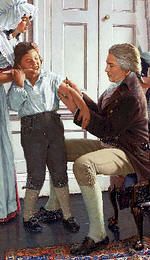|
 |
About vaccination
Sobre la vacunación |
|
For well over a thousand years, smallpox was a disease that everyone feared.
The disease killed much of the native population in South America when the
Spanish arrived there in the early sixteenth century. By the end of the
eighteenth century, smallpox was responsible for the deaths of about one in
ten people around the world. Those who survived the disease were left with
ugly scars on their skin. |
 |
|
It had long been well known among farmers that people who worked with cows
rarely caught smallpox; instead, they often caught a similar but much milder
disease called cowpox. A British doctor called Edward Jenner was fascinated by
this, and so he studied cowpox. He became convinced that, by vaccinating
people with the disease, he could protect them against the much worse disease
smallpox. |
|
In 1796, he vaccinated a boy with cowpox and, two months later, with smallpox.
The boy did not get smallpox. In the next two years, Jenner vaccinated several
children in the same way, and none of them got the disease. |
|
| |
|
 |
|
News of the success of Jenner's work soon spread. In 1800, the Royal Vaccine
Institution was founded in Berlin, Germany. In the following year, Napoleon
opened a similar institute in Paris, France. Vaccination soon became a common
method to protect people against other viral
diseases, such as rabies, and vaccines were sent across the world to the
United States and India. |
|
It took nearly two centuries to achieve Jenner's dream of getting rid of
smallpox from the whole world. In 1967, the World Health Organization (WHO)
started an ambitious vaccination program, and the last case of smallpox was
recorded in Somalia in 1977. |
|
| |
|
|
The story of vaccinations does not end there, however. There are many other
diseases that kill more and more people every year. In addition, many new
diseases are being discovered. The challenge for medical researchers will,
therefore, probably continue for several more centuries. |
|
VOCABULARY
|
|
 |
|
for well over:
durante bastante más de;
smallpox:
viruela; feared: temía; in the early: a principios de; about one in
ten people: aproximadamente una de cada diez personas; survived the disease: sobrevivieron
a la enfermedad; were left with
ugly scars: quedaron con antiestéticas cicatrices; well known: muy
popular, famoso; much milder: mucho más suave; cowpox: viruela
vacuna; by vaccinating: vacunando; much worse: mucho peor; none of them:
ninguno de ellos; soon spread:
pronto circularon; viral
diseases: enfermedades virales; rabies: rabia; vaccines:
vacunas; it took nearly: llevó casi; to achieve: lograr,
alcanzar; getting rid of: librarse de; the whole world:
todo el mundo; recorded: registrado; challenge: desafío. |
|
 |
Activity 122: Basándote en
los comentarios anteriores trata de completar el cuadro con la
cronología de acontecimientos en la historia de las vacunas. Verifica luego las
respuestas alternativas.
|
 |
|
DATE
|
EVENT |
|
Early 16th century |
|
|
End of 18th century |
|
|
1796 |
|
|
1800 |
|
|
1967 |
|
|
1977 |
|
|

|
¡¡ FELICITACIONES
!! Has finalizado la
LECCION 11
del curso Avanzado conversacional.
Antes de pasar a la última lección de este curso, por favor asegúrate de
repasar todo lo que has aprendido aquí. |
|